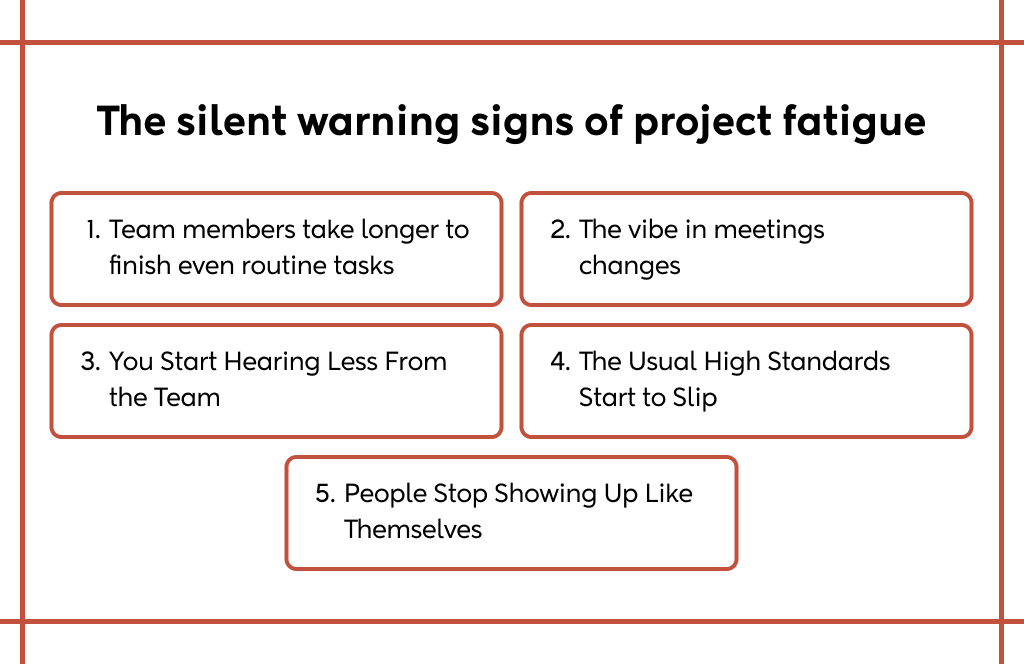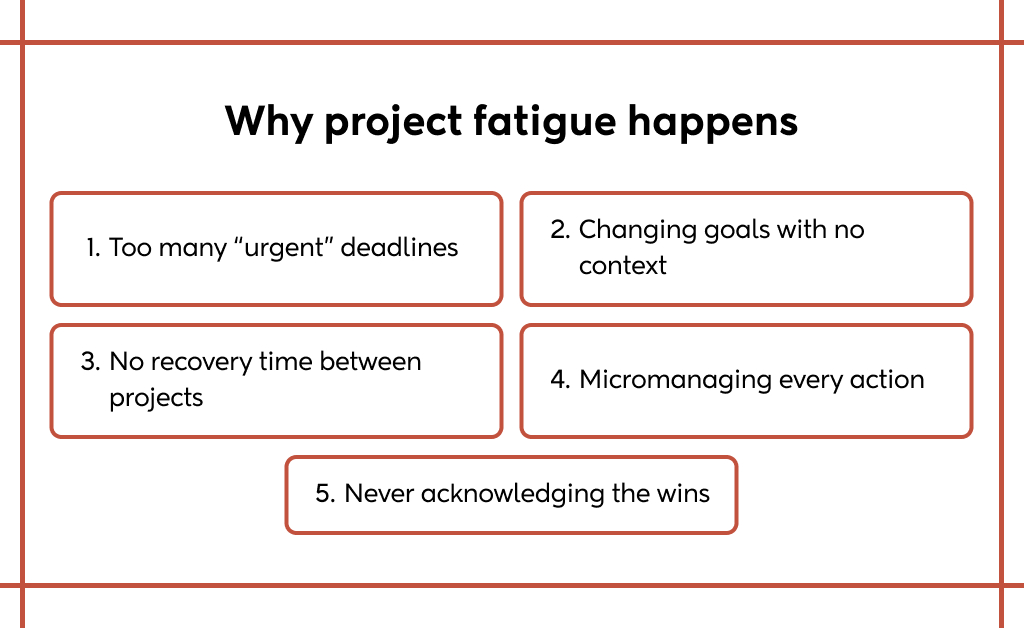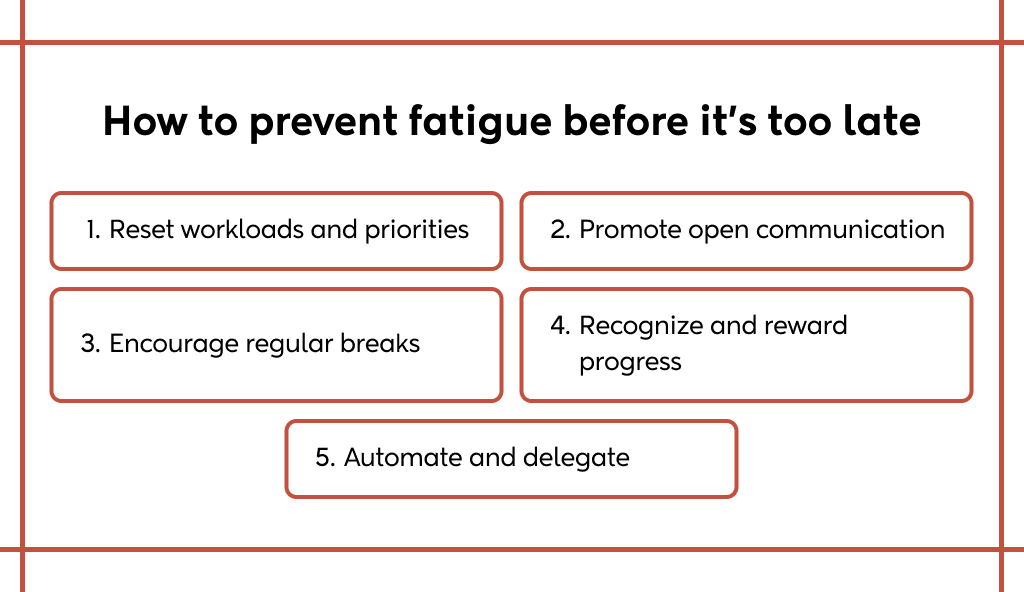You don’t always see burnout coming. It doesn’t begin with a breakdown. It starts with small things—slower responses, shorter tempers, and more silence in meetings. Over time, teams lose motivation. Deadlines slip. Work feels heavier. That’s project fatigue beginning to show up.
I’ve seen it happen on projects that looked great on paper—clear goals, skilled teams, even realistic timelines. Still, the energy dropped. Teams showed up, but they were not really present. What I’ve learned is that poor skills or laziness have nothing to do with fatigue. It results from working too long under pressure without time to recover.
Project fatigue is real, and if you’re leading teams, it’s your job to recognize it early. Because if you don’t, it will show up later as burnout, disengagement, or turnover.
Thus, let’s discover how to spot the signs of project fatigue before it is too late and what to do about it.
The Silent Warning Signs of Project Fatigue
I’ve seen project fatigue in teams where people were still logging in every day, still attending meetings, but mentally, they were done.

Here’s what I now pay attention to:
1. Team Members Take Longer to Finish Even Routine Tasks
Not because they’re slacking, but because they’re mentally overloaded. It’s just that the energy is not there. You’ll hear excuses such as, “Sorry, I’ve been meaning to get to this,” more often.
2. The Vibe in Meetings Changes
Discussions become shorter. Fewer people are speaking up. The spark, the curiosity is missing from your project teams. When the team is tired, they replace enthusiasm with silence or flat responses.
3. You Start Hearing Less From the Team
Your project team doesn’t share updates anymore. There are fewer status messages or less spontaneous check-ins. It doesn’t always mean people are avoiding work; they’re just trying to stay afloat.
4. The Usual High Standards Start to Slip
You may see more corrections, missed steps, or last-minute work. Not because the team stopped caring, but because their capacity to stay focused is worn thin.
5. People Stop Showing Up Like Themselves
They look tired. They sound distracted. Some take more time off. Some withdraw. It’s easy to write off as “just a bad week,” but when it’s happening across the team, it’s worth looking deeper.
These signs are subtle and easy to miss if you’re focused only on results. But if you spot them early and address them, you can stop project fatigue from turning into full-blown burnout.
Why Project Fatigue Happens
Project fatigue happens because we ask our teams to work relentlessly (without a break) while the goals keep changing.

The following are a few common causes of project fatigue:
1. Too Many “Urgent” Deadlines
When everything is a priority, nothing is. I’ve made the mistake of greenlighting too much at once, believing we could get through. All it did was drain teams quickly. The constant rush depletes focus and morale.
2. Changing Goals With No Context
Teams can handle change. What they can’t handle is confusion. If you shift priorities without explaining why, it creates doubt. People feel like they’re wasting effort. That’s exhausting.
3. No Recovery Time Between Projects
Some teams finish one intense project only to be thrown straight into the next. No pause. No debrief. Just another mountain to climb. That’s not sustainable, no matter how skilled or committed your team is.
4. Micromanaging Every Action
To tell the truth, early on, I struggled with letting go. I wanted to be involved in everything. But I saw how it saps teams. When you don’t give your team room to own their work, they stop being involved.
5. Never Acknowledging The Wins
This one took me a while to understand. When we didn’t pause to recognize progress, the team started seeing work as a slog, not an achievement. If all you ever say is “What’s next?” people burn out swiftly.
In every case, the underlying cause is simple: we forget that teams are made of people, not machines. Once you begin to see that, you will stop focusing only on deadlines and start paying attention to energy.
How to Prevent Fatigue Before It’s Too Late
Teams don’t crash suddenly; they wear down slowly, and if you’re not watching, you’ll miss the signs until you’ve got more serious issues on your hands.

Here’s what I’ve started doing differently to keep fatigue from building up:
1. Reset Workloads and Priorities
Most project managers take on too much, assuming they can “handle it.” I’ve also been guilty of it as a leader – adding just one more task, one more deliverable. But the truth is, not everything is equally important.
Now, we stop and audit our task lists. What makes the difference? What’s noise? We’ve gotten better at pushing back on scope creep and finding the productivity spot where output stays high without draining the team.
If a new request doesn’t align with the goal, it waits. My job is to protect the team’s bandwidth, not overload it.
2. Promote Open Communication
You can’t fix what you don’t know. And teams won’t always tell you they’re struggling, especially if they think it’ll be seen as a weakness or “not being a team player.”
That’s why I check in regularly and ask the questions: “How are you actually feeling about the workload?” or “What’s been draining you lately?”
Anonymous surveys help too. They highlight problems that people may not bring up directly. But nothing compares to honest, consistent conversations.
3. Encourage Regular Breaks
There’s this toxic mindset that taking breaks means slacking off. I used to think that as well. But I’ve seen the cost of elevating overwork – missed deadlines, conflicts, and growing work stress.
So now, we normalize downtime. Between big pushes, we reduce the load on purpose. And I try to model it too. If I’m sending emails at midnight, what message does that send? Leaders have to walk the talk.
4. Recognize and Reward Progress
Project managers are often so focused on what’s next that they forget to pause and acknowledge what just got done. But when you skip recognition, your team believes that their effort doesn’t matter, only outcomes do.
So, celebrate small wins on a regular basis. A quick shout-out on a call, a thank-you message, and a simple “good job” can make a significant impact. Also, remind your team why their work matters. When they see the bigger impact, teams get more motivated.
5. Automate and Delegate
There are tasks your team is doing right now that shouldn’t require human effort. You need to look for those and automate wherever you can – status updates, reminders, recurring work.
Also, learn to delegate properly. Not just assigning tasks, but trusting the person to make decisions. When you micromanage, people disengage. Giving autonomy back is one of the most powerful ways to reduce fatigue.
Conclusion
Project fatigue doesn’t mean your team is weak. It means your system needs adjustment.
As a project manager, your job is not only to track deliverables, but also to protect your team’s ability to deliver sustainably. That means you need to listen more, adapt promptly, and support your project team.
If you see the signs – procrastination, withdrawal, frustration, don’t ignore them. Take action, reset the pace, bring back clarity, and make space to recover because your team’s health is your project’s health.





























No Comments